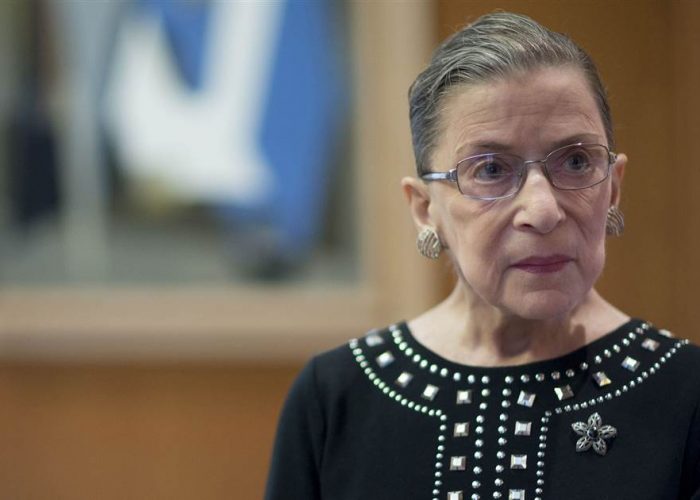Latino civic and advocacy groups have joined in the outpouring of sympathy over the passing of Supreme Court Justice Ruth Bader Ginsburg. The pioneering jurist died at her home in Washington on September 18 at 87. On the Court since 1993, Ginsburg was long a defender of the legal, civil, and constitutional rights of Latinos and immigrants.
Domingo Garcia, national president of the League of United Latin American Citizens, said, One of Justice Ginsburgs greatest legacies was that she understood and greatly respected the spirit of the law as much as the letter of the law. She was well aware of her place in history as one of the voices for the excluded, the oppressed, and those trying to find real justice in our courts. Garcia called upon the president and the senate to wait until 2021 before nominating a new justice.
On Twitter, Rep. Veronica Escobar (D-Texas), wrote, Our nation has lost a giant. Justice Ruth Bader Ginsburg was a pioneer and trailblazer who fiercely advocated for gender equality and womens rights. The life and legacy of the Great Dissenter will forever be celebrated and honored in American history.
The Hispanic National Bar Association, in its statement, called Ginsburg a legal giant and a fervent defender of civil liberties and civil rights… and a bridge-builder on our nation’s highest court.
Other advocacy groups, such as Latino Victory Fund, and Voto Latino, also expressed sadness over Ginsburgs passing. Los Angeles Times columnist Gustavo Arellano wrote that the best way to honor the late justices legacy would be to show up and vote on November 3.
In 2019, Ginsburg was a key vote in the Supreme Courts 5-4 decision to block the Trump administration from adding a citizenship question to the Census. She also joined with the majority in cases involving the Affordable Care Act (2015) and same-sex marriage (2015), two landmark rulings that impacted millions of Latinos and other Americans.
Ginsburg penned a fiery dissent in Shelby County v. Holder (2013), which dismantled a key provision of the Voting Rights Act mandating that southern states get federal approval before changing voting laws. “Throwing out preclearance when it has worked and is continuing to work to stop discriminatory changes is like throwing away your umbrella in a rainstorm because you are not getting wet, she wrote.
The Shelby County case has had significant implications for Latinos and other communities of color, as it resulted in new rules and restrictions on votingwhich can be viewed as attempts at voter suppression.
On immigration, Ginsburgs opinions reflect a consistent concern for the rights of migrants, including immigrant detainees. In June 2020, she sided with the Courts majority in DHS. v. Regents of the University of California, finding that the Trump administration had improperly terminated the DACA program (which grants deportation relief to certain young immigrants). In Arizona v. U.S. (2012), Ginsburg again sided with the majority, this time striking down three provisions in Arizonas SB1070, the states controversial papers, please law. In Demore v. Kim (2003), Ginsburg was in minority, arguing against lengthy mandatory immigrant detention. In Zadvydas v. Davis (2001), she joined with the majority in finding that the government could not hold immigrant detainees indefinitely if their home countries refused to accept their repatriation.
Supreme Court Justice Ruth Bader Ginsburg was a fierce trailblazer in the fight for womens equality and a champion for justice. I join freedom fighters everywhere in mourning her passing, said Greisa Martinez of United We Dream, the countrys largest immigrant youth-led network, in a statement. You will be missed, but your impact and legacy will be far reaching. We will continue to honor your legacy with our work. ¡La lucha sigue! The fight continues! Rest in power, Justice Ginsburg.
Justice Ginsburg, who served on the high court for 27 years, was herself a daughter and granddaughter of immigrants. Her father was a Jewish immigrant from Russia. Her mother was of Austrian-Jewish background.
In 2018, speaking at a Naturalization Ceremony in Washington D.C., Ginsburg noted that immigrants have historically been on the vanguard of the fight against discrimination. We are a nation made strong by people like you, she said, people who travelled long distances, overcame great obstacles and made tremendous sacrifices, all to provide a better life for themselves and their families.
Follow NBC Latino on Facebook, Twitter and Instagram.read more
A voice for the ‘excluded’ and ‘oppressed’: Latinos remember Justice Ruth Bader Ginsburg


